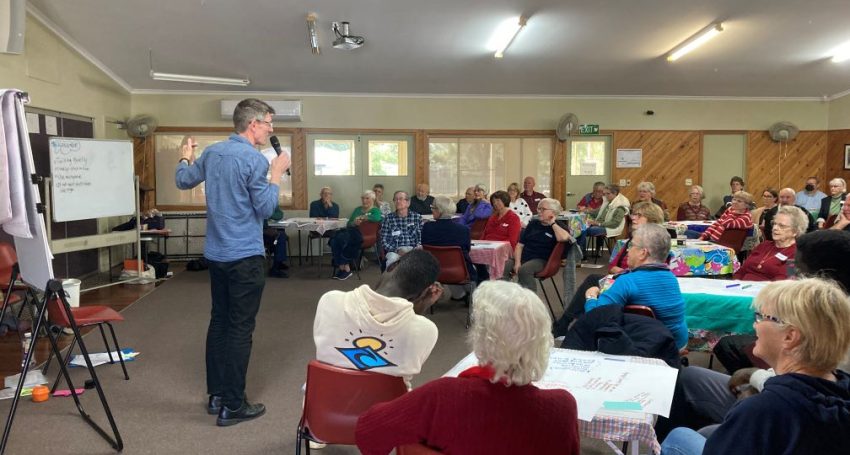What is a Mission Action Plan and why are MAPs important?
Resources & Research
“A MAP isn’t a corporate design process looking into a five- to 10-year ‘crystal ball’, identifying an egocentric vision and specifying how we’ll achieve it. Mission Action Planning is the documenting of prayerful discernment conversations by a faith community regarding where and how it’s being called to participate in God’s mission,” says Ministry Development Officer The Rev’d Tim Booth

Thirty-odd parishioners from St James’, Toowoomba and St Anne’s, Highfields are chatting around coffee tables on a sunny winter’s day. They are discussing the question, “In the past five years, what have we looked like at our best?”
Then they use an open space dialogue process to nominate and prioritise projects for the next 18 months. Four months later Parish Council ratified priority projects and appointed working group leaders.
For example, a diversity banner and signage project has commenced, with parish community members designing symbols representing different demographics of people encompassed by the “all are loved, all are welcome” invitation.
What is a Mission Action Plan (MAP)?
A MAP isn’t a corporate design process looking into a five- to 10-year “crystal ball”, identifying an egocentric vision and specifying how we’ll achieve it. Mission Action Planning is the documenting of prayerful discernment conversations by a faith community regarding where and how it’s being called to participate in God’s mission.
Why are MAPs Important?
MAPs are important in a faith community because they:
- Ensure mission discernment conversations actually take place.
- Focus attention by articulating a shared understanding of a parish’s sense of calling.
- Align activities with the parish’s vision and/or values.
- Allow good stewardship of often limited time, money, property and energy resources.
- Ensure effort is put into concrete, detailed and measurable planning to enliven activities and projects: “fail to plan = plan to fail”.
- Mobilise people through nominated roles and accountabilities.
- Share responsibility for mission and ministry — regardless of who’s in leadership positions at a given time.
- Enable the parish to flag to the wider Diocese and wider community its sense of identity, purpose and specific mission and ministry directions — that is, its niche in the Anglican Church Southern Queensland (ACSQ).
- Add rigour in instances where strategic decisions need to be made about parish property assets and the involvement of the ACSQ Property Team.
- Help parishes identify where they need assistance to fulfil their mission.
What Might a Typical MAP Process Look Like?
A parish might start by forming a MAP task group to work with the parish priest. They can discuss the scope of visioning process, congregational engagement approaches and the option of an external facilitator.
A period of preparation commences by communicating to parishioners the MAP process and incorporating it into worship preaching and intercessions, as well as small group discussions.
A survey, like the National Church Life Survey, might be used.
A visioning day can clarify/revisit parish identity, values and sense of purpose (e.g. vision, mission values and strengths statements), and specify and prioritise projects/activities.
Parish council then ratifies and finalises priorities, persons responsible, timelines and other specifics.
Five top tips for Mission Action Planning:
- Prayerfully seek God’s guidance throughout.
- Maximise people-involvement opportunities: small group discussion groups; a visioning day and, for those who can’t make it, an online visioning session; notice board promotions and online parish communications; and, service announcements.
- Keep MAP momentum going during inevitable rhythms of parish life by enlisting creative and energetic people in your MAP task group.
- Communicate your missional updates and outcomes. Then, when you’ve finished, communicate more!
- Recognise God’s timing. As important as goal setting are plans that set directions and provisional timelines that can be revisited and re-set as needed.
Where can parishes find more information?
- Check out resources on the faithful + effective website.
- Contact me (Tim Booth, Ministry Development Officer) for assistance with MAP development via 0460 030 575 or tim.booth@anglicanchurchsq.org.au
Editor’s note: Resource Church St John’s Cathedral will be hosting a free workshop on ‘Complexity and Mission Action Planning’ at St Francis College on Saturday 7 October from 10am to 4pm. This workshop will explore Mission Action Planning and other parish planning in a way that reflects the changing nature of our complex world. Facilitators experienced in complexity theory — Vivienne Read and Julie Cunningham from Complexability Pty Ltd — will assist parishes with techniques enabling them to adapt to the changing world and their communities. Laity and clergy are encouraged to attend. The Rev’d Tim Booth, who assisted in planning the day, will also be attending. Register online.





